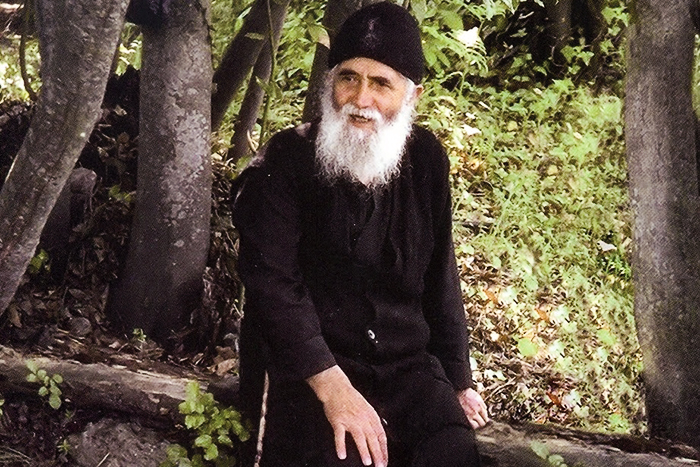“We must force ourselves to do good.”
– St. Seraphim of Sarov
Orthodox Christians do very little by whim. This is not to say that there is no room for genuine freedom or spontaneity in one’s life of faith. For as the Lord Himself says, “The wind blows where it wills, and you hear the sound of it, but you do not know whence it comes or whither it goes; so it is with every one who is born of the Spirit.” (John 3:8)
Yet there is a big difference between living by the Holy Spirit and living by caprice. On the one hand, the Spirit of God often inspires believers with the gift of a marvelous, creative spontaneity that cannot be dictated by any formal agenda. Having brought the Ark into the city of Jerusalem, David the King spontaneously dances for joy, leading the way. In the book of Acts, the Holy Apostle Philip spreads forth the gospel, not according to any worldly plan, but by being so caught up by grace that he is like the wind, gusting forth from one place to another. “And when they came up out of the water, the Spirit of the Lord caught up Philip; and the eunuch saw him no more, and went on his way rejoicing.” (Acts 8:39).
On the other hand, it must be stated that whim is born not of grace but of individual impulsiveness, which is an enemy of the spiritual life. All too often, many Christians fall into a whimsical, inconsistent type of shallow faith dictated by mood. When one feels cheerful and elevated, when the heart is full of light and joy and peace, one may choose, at that moment, to pray, or to read the scriptures, or perhaps even attend the Holy Liturgy. But when things grow dark and the inner man of the heart is lonely and sorrowful – trodden low to the ground, one finds it “impossible” to pray or read or worship.
Yet this is in actuality a delicately laid trap of the devil who knows that if he can convince believers that feelings are paramount, it is only a matter of time before they can be torn from the fold. So the point is this: Faith must be grounded and nourished by something deeper and more trustworthy than human emotions. Yet American Christians, by and large, have shown themselves to be especially susceptible to this kind of “feel-good” capricious spirituality which is its own benchmark of success. Millions of dollars pour into the pockets of religious charlatans who proclaim a one-sided gospel devoid of the message of the Cross and the hardship it necessitates. Religion is here to make people feel good. If it doesn’t, then why bother?
But here is where self-denial comes into play. Part of denying oneself for the love of Christ means, as St. Seraphim of Sarov says, to “force ourselves to do good.” In the most practical sense, this means doing the right thing, for the right reason and at the right time, not whenever one “feels like doing it.” Those who follow Christ and pick up their Cross know that this means the cutting off of the self-will, or more accurately, the complete renouncing of the “will-to-self.” “For not everyone who prays ‘Lord, ‘Lord,’ will enter the Kingdom of Heaven, but he who does the will of my Father in Heaven.” (Matthew 7:21).
Obedience to prayer, fasting, and the liturgical worship of the Church functions as a good test of self-denial. Indeed, sometimes what the Lord loves more than anything else is a heartfelt prayer offered at the right time of the day (or week) – even when it is born from a thread-bare heart that is weighed down with weariness. The psalms not only bear witness to this truth by showing us how to praise God in all circumstances, good and bad, but also provide the “voice” by which every follower of Christ can pray in joy or in sorrow. “O Lord, my heart is in anguish within me, the terrors of death have fallen upon me. Fear and trembling come upon me, and horror overwhelms me.” (Psalm 55:4-5).
Those who surrender themselves to the life-long rhythm of the Church’s prayer, fasting, and worship are sooner or later blessed by a depth of soul that bears much fruit. Sooner or later they discover marvelous well of grace that is infinitely deep. As they plunge deeper and deeper into their heart of hearts, they are led to a place of total mystery, to a place where heaven and earth meet, to the living throne of Christ Itself. “For the Kingdom of God is within you.” But this never comes easily. It is a gift the grace given to those who know how to fight the good fight.
So again, it must be stressed that this face to face divine-human encounter cannot and will not happen all at once. Rather, it is given to those who have labored in the spiritual life, day in and day out, as true followers of Christ, by having remained with Him at the “foot of the Cross” – throughout good times and bad.
How tragic, indeed, that some have come see the Church’s regimen of both private and corporate prayer as a burden, as a repetition of rituals devoid of meaning and purpose. But those who worship the Lord “in Spirit and truth” know something different: that a whimsical faith is no faith at all, and that practicing one’s faith only when it is convenient or when one “feels” like it is to practice no faith at all.





